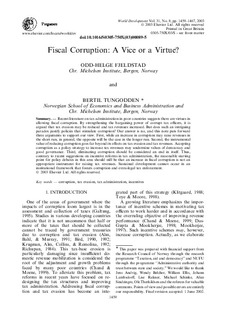Fiscal corruption: A vice or virtue?
Journal article, Peer reviewed
Permanent lenke
http://hdl.handle.net/11250/2474999Utgivelsesdato
2003-01-01Metadata
Vis full innførselSamlinger
- Publications [1488]
Sammendrag
Recent literature on tax administration in poor countries suggests there are virtues of allowing fiscal corruption. By strengthening the bargaining power of corrupt tax officers, it is argued that tax evasion may be reduced and tax revenues increased. But does such an intriguing paradox justify policies that stimulate corruption? Our answer is no, and this note puts forward three arguments to support our view. First, while an increase in corruption may raise revenues in the short run, in general the opposite will be the case in the longer run. Second, the instrumental value of reducing corruption goes far beyond its effects on tax evasion and tax revenues. Accepting corruption as a policy strategy to increase tax revenues may undermine values of democracy and good governance. Third, eliminating corruption should be considered an end in itself. Thus, contrary to recent suggestions on incentive reforms in tax administration, the reasonable starting point for policy debates in this area should still be that an increase in fiscal corruption is not an appropriate instrument for raising tax revenues. Sustained development cannot grow from an institutional framework that fosters corruption and extra-legal tax enforcement.
Serie
World Development vol. 31 no. 8World Development vol. 31 no. 8
